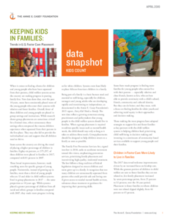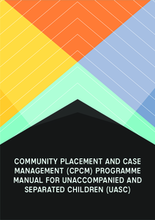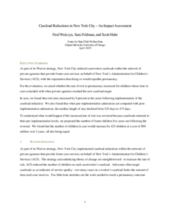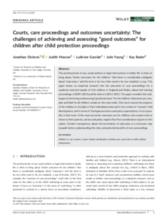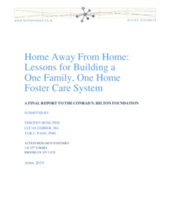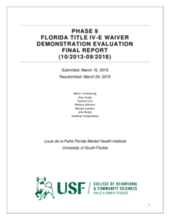Displaying 871 - 880 of 2221
In this data snapshot, the Annie E. Casey Foundation examines how placements for young people in foster care have changed from 2007 to 2017.
This study investigated the relationship between familial residential school system (RSS) exposure and personal child welfare system (CWS) involvement among young people who use drugs (PWUD).
The Community Placement and Case Management (CPCM) Programme aims to provide a holistic case management system that specifically looks into the protection concerns of migrant, undocumented, stateless, refugee, and asylum seeking Unaccompanied and Separated Children (UASC) at risk of arrest and detention and those directly affected by immigration detention in Malaysia.
For this evaluation, the authors asked whether the rate of exit to permanency increased for children whose time in foster care in New York City coincided with when private foster care agencies reached the new reduced caseload target.
This open access paper draws on empirical research into the outcomes of care proceedings for a randomly selected sample of 616 children in England and Wales, about half starting proceedings in 2009–2010 and the others in 2014–2015. The paper considers the challenges of achieving and assessing “good outcomes” for the children.
This theoretical-empirical study is based on two particular case studies of families bringing up children from institutional care in Slovakia.
This report describes lessons learned from a centerpiece of Home Away From Home: coaching, technical assistance, and data analysis activities aimed to improve the recruitment, training, support and retention of foster homes and build kinship caregiving capacity.
As technology enhancements effectively augment family-based interventions, the purpose of this study was to pilot a smartphone application (app) in the context of a trauma and behavior management-informed training for foster and kinship caregivers.
This report presents findings from an implementation analysis aimed at describing implementation of the U.S. state of Florida Title IV-E Demonstration Project, which allowed the state to use certain federal funds more flexibly, for services other than room and board expenses for children served in out-of-home care.
In the current study, the authors examined the factor structure of the Children’s Depression Inventory in an ethnically diverse sample of adolescents in foster care in the US and examined the configural invariance of the measure across ethnic groups.

